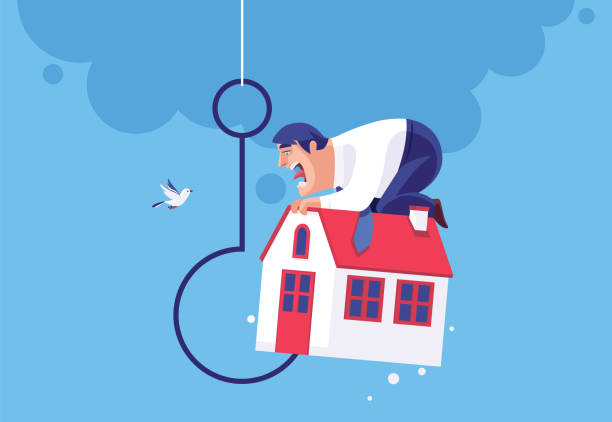What happens to mortgage if homeowners insurance is cancelled? Homeownership is a significant milestone that often involves complex financial arrangements and responsibilities.
Among these responsibilities, securing homeowners insurance stands as a crucial shield against unforeseen events that could threaten the value and integrity of one’s property.
However, the relationship between homeowners insurance and mortgages is intertwined in a manner that demands careful consideration.
What happens if homeowners insurance, a safeguard against risks ranging from natural disasters to liability claims, is unexpectedly cancelled?
This inquiry delves into the intricate dynamics of homeowners insurance cancellation and its potential repercussions on the mortgage arrangement.
From the legal ramifications to the financial implications, this article aims to shed light on the steps homeowners must take to protect their investment and maintain the stability of their mortgage agreement.
By understanding the intricate interplay between homeowners insurance and mortgages, homeowners can navigate the challenges of insurance cancellation and make informed decisions that safeguard both their property and their financial well-being.
Also Read:
How to Transfer Ownership of a House with a Mortgage
What Do Mortgage Lenders Look For on Bank Statements?
What Happens to Mortgage If Homeowners Insurance Is Cancelled?
If homeowners insurance is cancelled, it can trigger a series of significant consequences that impact both the homeowner and the mortgage lender.
Homeowners insurance is not just a protective measure; it’s often a requirement by mortgage lenders to ensure the property’s value and their financial interests are safeguarded.
When homeowners insurance is cancelled, it usually breaches the terms of the mortgage agreement.
This breach can give the lender the right to take action to protect their investment. One common response is lender-placed insurance, where the lender purchases an insurance policy on the homeowner’s behalf.
However, these policies tend to be more expensive and offer limited coverage.
Financial risks also arise for homeowners.
Without insurance, they are vulnerable to property damage, liability claims, and other unexpected expenses.
Moreover, the lender might require immediate payment of the remaining mortgage balance if the property becomes uninsurable.
Cancellation often stems from non-payment of premiums, changes in property conditions, or increased risk factors.
Preventive measures include timely premium payments, property maintenance, and risk mitigation.
Overall, cancelling homeowners insurance can trigger a breach of the mortgage agreement, lender-placed insurance, financial vulnerabilities, and even foreclosure.
Homeowners should be proactive in maintaining adequate insurance coverage to uphold their financial security and the integrity of their mortgage commitment.
Consequences of Homeowners Insurance Cancellation
Homeowners insurance cancellation can lead to a cascade of detrimental consequences for both homeowners and their mortgage lenders.
This termination of coverage can expose homeowners to a range of risks, leaving them financially vulnerable and compromising the integrity of their property investment.
Firstly, cancelling homeowners insurance can breach the terms of the mortgage agreement.
Mortgage lenders typically require insurance to protect their financial stake in the property.
Such a breach could empower the lender to impose costly measures, like lender-placed insurance, which often comes with higher premiums and limited coverage, negatively affecting the homeowner’s financial stability.
Furthermore, homeowners without insurance are at heightened risk.
In the absence of coverage, they become liable for repairing property damage resulting from events like natural disasters, accidents, or theft.
This financial burden can strain their resources and jeopardize their ability to meet mortgage payments.
Additionally, homeowners insurance cancellation may escalate into foreclosure proceedings.
Mortgage lenders might perceive the absence of insurance as a breach of contract, prompting them to accelerate the loan and demand immediate repayment.
This could force homeowners into an unsustainable financial position, leading to the loss of their home.
Overall, the consequences of homeowners insurance cancellation encompass breach of the mortgage agreement, increased financial risks, and potential foreclosure.
Ensuring continuous and adequate insurance coverage is crucial to preserving homeowners’ financial security and the stability of their property investment.
Steps to Prevent Homeowners Insurance Cancellation
To prevent homeowners insurance cancellation and its potential repercussions, homeowners can take several proactive steps to ensure continuous coverage and maintain the integrity of their mortgage commitment.
Firstly, consistent and timely premium payments are essential.
Setting up automatic payments or reminders can help avoid missed deadlines that might lead to policy lapses.
Regular property maintenance and upgrades are crucial.
Keeping the property in good condition reduces the likelihood of insurance cancellations due to property deterioration, which insurers may view as increased risk.
Homeowners should also implement risk mitigation measures.
This could involve installing security systems, fire alarms, and safety devices, which can not only deter potential hazards but also demonstrate to insurers the commitment to minimizing risks.
Open communication with the insurance provider and mortgage lender is vital.
Informing them about any changes to the property or potential risk factors can help maintain trust and transparency in the insurance arrangement.
Moreover, exploring different insurance policies and providers can offer alternatives if the current policy is at risk of cancellation.
Comparing coverage options and premiums can ensure homeowners find the best fit for their needs.
Overall, preventing homeowners insurance cancellation requires consistent premium payments, property upkeep, risk reduction, communication with insurers and lenders, and staying informed about available insurance options.
These steps collectively safeguard homeowners’ financial security, the integrity of their mortgage, and the protection of their property investment.
Also Read:
What Is an Assignment of Mortgage? (Find Out Now)
What Is a Partial Claim Mortgage? (Find Out Now)
Conclusion
The cancellation of homeowners insurance can trigger a domino effect of adverse consequences affecting both homeowners and mortgage lenders.
Breaching the mortgage agreement, potential lender-placed insurance, financial vulnerability, and even foreclosure loom as significant risks.
Timely premium payments, property maintenance, and risk mitigation are essential preventive measures.
By understanding the intricate relationship between homeowners insurance and mortgages, homeowners can proactively safeguard their property investment, financial stability, and the sanctity of their mortgage commitment.
Continuous insurance coverage stands as a critical cornerstone in maintaining a secure and stable homeownership journey.










